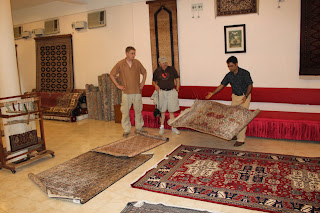Kerala is the district in which Cochin is located and is one of the most prosperous districts of India. Malayalam is the official language of Kerala, but most Keralites speak English and many speak Hindi. The major religions in Kerala are Hinduism (about 56%), Islam (about 25%), and Christianity (about 19%). Kerala also had a tiny Jewish population.
Kerala ranks highest of all states in India with respect to social development such as primary education and healthcare. The literacy rate in India is about 90% and Kerala has a literacy rate of approximately 94%, the highest among Indian states.
Kochi (Cochin) is known as the Queen of the Arabian Sea. Cochin and Kochi refer to the same place, as it the case with Bombay and Mumbai, etc., with Kochi being the Indian name for the city while is the name given by the British when they invaded India. Both names are used interchangeably.
Cochin is also referred to as the Gateway of South India. It is regarded as the commercial and industrial capital of Kerala. Approximately 1,600,000 people live in Cochin. The main industry is tourism and the principal occupations are trading and fishing.
We stopped at a local market to see how residents come to market each day to purchase the fresh food they would need for the day. Always a fresh meal.
We then visited the Church of St. Francis, which dates back to the 15th century. It is the oldest church built by Europeans in India. On his 3rd visit to Kerala, Vasco da Gama, the Portuguese trader who reached India from Europe by sea, became ill and died in Kochi. He was buried in the St. Francis Church. Later his remains were taken back to Portugal. In spite of that, the exact place where he was buried has been marked out inside the church.
We walked along the shores of the Arabian Sea where we saw the Chinese fishing nets, the only nets of their kind in India. The nets span over large wooden structures and are dipped into the ocean and brought back out by a system of cantilevers and counter weights. We also watched local fishermen auctioning their catch for the market.
We next visited the Jewish Synagogue. The synagogue is magnificently decorated by Chinese tiles and Belgian chandeliers. The floor is paved with hand-painted blue and white tiles. Giant scrolls of the Old Testament can be found here.
The Jewish Synagogue is located in an area known as Jew Town, or Spice Town since the ancient trade of selling spices takes place there. Here you find shops selling curios, handicrafts and spices.
Mass in the Boardroom
Bob was fortunate to have an opportunity to visit with his
Cochin friend, Babu Kuruvilla, and Babu's wife, Recty,
and daughter, Anna.
Our trusted guide and trinket negotiator, Priyankar Rishi
The Chinese fishing nets
Rishi negotiates with a young street vendor
Jamie samples local hootch commonly called a Toddy
We stopped at a small roadside stand to sample some Pan, also called murukan (MOOR-ee-khan). Murukan is a combination of ingredients that you chew and then spit, just like tobacco. The ingredients are vettila (a mint leaf in which the other ingredients are wrapped), adaka (black and red nuggets that come in a little packet), churnnamp (a white lime paste that is spread on the mint leaf), and podala (shredded tobacco). When you chew it, your spit turns a deep red color. It signifies the unity of the world – white, brown and black are mixed together to make red, the color of everyone’s blood. Since the rumor was that the shredded tobacco would give a slight kick, only the young guys, Jamie, Ryan and Fr. Laird, gave it a try.
Ralph gets ready for the Rice Boat Cruise































No comments:
Post a Comment